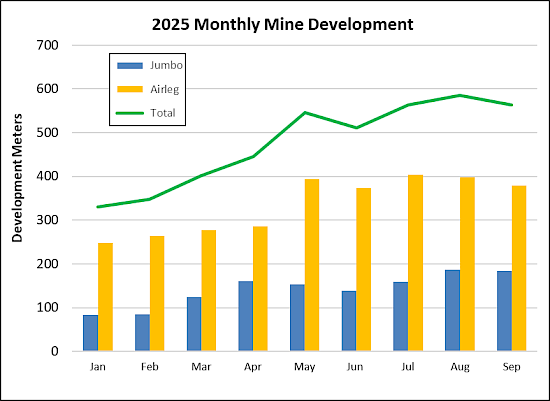Lion One Metals Ltd. has reported solid progress at its 100 percent-owned Tuvatu Alkaline Gold Project in Fiji, achieving stronger production results and faster underground development as the mine moves deeper into commercial operations.
The Canadian gold miner said it produced 5,704 tonnes of material grading 10.60 grams per tonne (g/t) gold from its first shrinkage stope, marking a milestone in underground mining at Tuvatu. The company described the initial stope as “a success,” adding that it demonstrated the suitability of shrinkage mining for Tuvatu’s narrow high-grade veins.
Most of the production from the first stope took place between July and September and was blended with ore from other parts of the mine. A second, larger shrinkage stope — expected to yield 11,520 tonnes — is now being developed, with production scheduled to begin in November.
The second shrinkage stope is expected to be twice as large as the first, the company said.
Lion One also reported a 70 percent increase in underground development rates between January and September this year. Monthly development advanced from 330.8 metres in January to 563.9 metres in September, allowing the company to access new production zones and speed up its capital development plans.
Chief Executive Officer Ian Berzins said the company was “very pleased both with the success of the shrinkage stope and with the increased development rates at Tuvatu.”
“These achievements have been made possible because of the new mining equipment and operational improvements initiated on site over the past several months,” Berzins said. “We’re excited for the next shrinkage stope to come online and for the arrival of still more new mining equipment as we continue to advance operations at Tuvatu.”

Boosting mine efficiency
The first shrinkage stope was located in Zone 2 on the northwest side of Tuvatu, targeting the Ura1 lode, which measures roughly 62 metres long, 24 metres high and 1.5 metres wide. Production began in July and has now been completed.
The second stope, twice the size of the first, lies in Zone 5 on the east side and focuses on the UR2 lode, measuring around 60 metres long and 50 metres tall. Production is expected to finish by mid-January 2026.
Shrinkage stoping, a technique suited to narrow, steeply dipping veins, allows miners to recover more ore with less dilution compared with traditional long-hole mining. Lion One said this method was “an optimal mining approach” for Tuvatu’s geology.
To support faster development, the company introduced productivity improvements and invested in new underground equipment, increasing the rate of large capital development by 126 percent and small development by 59 percent.
Large development rounds rose from 0.77 to 1.74 rounds per day, while smaller ore-zone development increased from 4.43 to 7.03 rounds per day.
Lion One modified its mining cycle by separating drilling and bolting operations to improve jumbo utilisation. It also converted a Caterpillar IT28 utility vehicle into a bolting platform and acquired an RES scissor lift and a third two-boom jumbo to expand its underground fleet.
“With a third jumbo and dedicated bolting equipment, we anticipate development rates will continue to improve,” the company said.
Leadership transition
In the same announcement, Lion One confirmed the retirement of Chief Operating Officer Patrick Hickey, who joined the company in 2021 and played a central role in constructing and commissioning the Tuvatu Gold Mine.
Chairman and President Walter Berukoff said: “On behalf of the Board and the entire Lion One team, I want to thank Patrick for his leadership and dedication during this critical period in the Company’s growth. Patrick’s contributions have laid the foundation for Tuvatu’s continued success, and we wish him all the best in his retirement.”
Hickey’s responsibilities will now be taken over by CEO Ian Berzins.
About Lion One Metals
Lion One Metals Ltd. is an emerging gold producer headquartered in North Vancouver, British Columbia. The company’s Tuvatu project, located on the island of Viti Levu in Fiji, includes an underground mine, pilot processing plant and assay laboratory. The broader Navilawa Caldera area, covered by the company’s exploration licence, hosts several promising mineralised zones.
The Tuvatu Alkaline Gold Project, which entered production in late 2023, remains Lion One’s flagship asset and one of the most significant new gold operations in the South Pacific.










